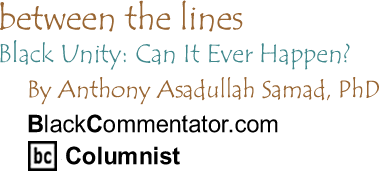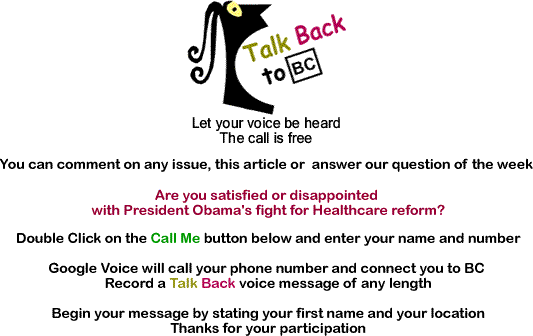
|
||||||||||||||||||||||

|
|
 |
|
| Since President Barack Obama achieved what most Blacks (if not all Blacks) thought was impossible, this call for “Black unity” has been an overarching theme of everything the African American community (multiple and singular) desires to achieve in the 21st Century. People who have never agreed on the same thing, at the same time, EVER, since someone suggested we just walk away from slavery, suddenly got this “lovin’ feelin’,” conditional - of course. The divide in Black America is as large as ever. The “my way or the highway” mentality is prevalent, despite Obama ‘s name being invoked at every turn. Stuff like, “If Barack Obama can be elected President of the United States, we mostly certainly can come together.” It’s sickening, largely because it’s most commonly voiced by many who didn’t believe Obama could be elected President in the first place. The vision behind his candidacy was absent in many that now have had an epiphany. Most had to be run over, literally, by the change they were standing in front of. That epiphany is that “some people” realized they were about to be left behind, and Black people never met a bandwagon they couldn’t catch. Opportunities for change are often lost in the “debate” (if you want to call it that) of what change is and who is really capable of change. Whether the debate is generational or ideological, neither side of the debate really believes that the other has the answer to bring real change into reality. The “age of Obama” has changed one reality about America, but whether it changes the state of Black communities has yet to be seen. The fact is, if we had waited for Black unity to come about on the simple question of whether Barack’s candidacy was credible before we supported him, Obama would have never been elected, because the divide was in evidence and deeply entrenched. One side had to do what they had to do. The other side jumped on the bandwagon after the outcome was in evidence. That’s a fact. The call for Black unity is often a call to disrupt the opportunity for change. So when certain people call for change, why don’t I believe them? Whether
it was the run-away or the enslaved, the freedman (emancipated slave)
or the free man (Blacks who had never been enslaved), the emergence
of the so-called “Black leader” voice in Frederick Douglass or Martin
Delany, Booker T. Washington or W.E.B. DuBois, Marcus Garvey or
A. Phillip Randolph, Walter White or Charles Houston, Martin Luther
King or Roy Wilkins (or Thurgood Marshall), Elijas and Malcolm,
the Panthers and US, Farrakhan and Jesse, the Baptist and the Methodists,
Christian and Muslims, the Crips and Bloods, Rich and poor, dark
skinned and light skinned and the examples go on and on, Black America
never operated from a single united point of view. The largest (and
most disruptive) divides in the history of Black America stemmed
out of questions of when it was time to change, why we needed to
change, how the change would occur, and of course something we can
never ignore, who would lead the change. Many times, most change
agents were of the same ideology, all wanting to Whatever the reason, ideas about progress somehow never give way to unity. It’s never about unity, but the “winners” and “losers” in the cause of change. Rarely, change is the winner because of the mindset that if we all can’t win, none of us will win. We can’t move the ball up the field ten yards at a time. It’s a touchdown or interception on a “Hail Mary” pass. Some of us can’t win now and others win later. Because those at the bottom of the well don’t trust that there will be a later. So nobody goes anywhere. Just look at the absence of change in every city in America. The evidence of “lost battles” are in evidence. Change is not in evidence. Every organization, group, cluster, “movement” I’ve ever been involved in, over three decades, was undermined on the “unity” tip. Even in the 21st Century “change movement,” the vestiges of Black disunity that causes the Black divide in the 19th and 20th Centuries continue to persist. It doesn’t mean change won’t occur. It just means some will catch the bandwagon on the other side (if they ever catch it at all). The call for unity is the toughest challenge for Black America. It’s almost as impossible as electing a Black President. At least I can say I’ve seen one of them in my lifetime. I have serious doubts about the other.
BlackCommentator.com Columnist, Dr. Anthony Asadullah Samad, is a national columnist, managing director of the Urban Issues Forum and author of Saving The Race: Empowerment Through Wisdom. His Website is AnthonySamad.com. Click here to contact Dr. Samad. |
|
|
|
 |
|
Any BlackCommentator.com article may be re-printed so long as it is re-printed in its entirety and full credit given to the author and www.BlackCommentator.com. If the re-print is on the Internet we additionally request a link back to the original piece on our Website. Your comments are always welcome. eMail re-print notice
If you send us an eMail message we may publish all or part of it, unless you tell us it is not for publication. You may also request that we withhold your name. Thank you very much for your readership. |
|
| |
|
| October
22 , 2009 Issue 347 |
|
| Executive Editor: Bill Fletcher, Jr. |
| Managing Editor: Nancy Littlefield |
| Publisher: Peter Gamble |
| Est. April 5, 2002 |
Printer Friendly Version
in resizeable plain
text format or pdf
format. |
 |

|
| |
| |









































